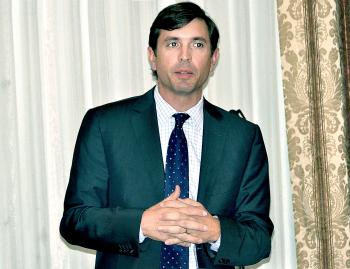
LABI chief: Reforms, investments needed for long-term growth
The anticipated economic growth in Louisiana is a great opportunity but not a guarantee, which is why reforms and investments are needed to ensure that growth is sustainable, Louisiana Association of Business and Industry President Stephen Waguespack said Monday.
Educational and legal reforms will make the workforce needs and business-friendly legal climate possible, Waguespack said.
Waguespack, the newly appointed president of the Louisiana Association of Business and Industry, was the guest speaker at Monday’s St. Mary Industrial Group meeting.
The association connects business leaders and public officials, according to its website.
Waguespack took over as president of the association about a month ago, replacing Dan Juneau, who was president for 27 years. Waguespack came from Jones Walker law firm where he directed the firm’s multi-state government relations practice.
Waguespack also served as chief of staff, deputy chief of staff executive council and policy director for Gov. Bobby Jindal.
Waguespack said the No. 1 issue he has heard from people in his first few weeks on the job is workforce supply. More than $60 billion in new projects have been announced in Louisiana, he said. “We also know what comes with that, 250,000 skilled workers will be needed to construct all of that.”
Another 69,000 jobs will be needed in math, science, and critical thinking, he said.
Educational reforms will help secure jobs for Louisiana workers. Course choice is one of those reforms, which allows students to take a course at another school if the course is not offered at their school, Waguespack said.
The organization aims to help educate students on the paths they need to take to get certain jobs, whether that is through course choice, classes at their own school, or through a local community or technical college, he said.
“We’ve got to go to the kids and make sure they understand the value because that is our future workforce,” he said. In 10 years, when a company is looking to locate a plant in Louisiana, if the state does not have its “workforce pipeline” figured out, the company will go somewhere else, he said.
Louisiana must supply the workforce to keep the economic boom, he said.
Louisiana companies also have to overcome the fear of legal action to make decisions that will let companies compete within the state and outside the state, he said.
Waguespack cited the Southeast Louisiana Flood Protection Authority lawsuit where 97 companies were sued to make them pay reparations for damage to the coastline.
“Everyone understands the value of our coastline. Everyone understands the vulnerability of it, but we also understand you can produce, enjoy and protect natural resources at the same time,” he said.
The association will push to make sure the state’s legal climate gives small and midsize businesses fair access to the courts, but will also prevent “a feeding frenzy on our jobs creators and investors,” he said.
Many Louisiana businesses are affected a lot more by what happens in Washington, D.C., than by what happens in Baton Rouge, he said.
Regarding flood insurance issues, Waguespack said businesses and properties will not expand or invest as much in the state if flood insurance rates are not kept in check.
How the Affordable Care Act is implemented over the next year is an important issue for businesses, and there is a lot of uncertainty surrounding the implementation, he said.
Waguespack looks to build off the previous successes and look for ways to improve the association’s effectiveness inside and outside Baton Rouge. Waguespack wants to make sure people’s voices outside of Baton Rouge are heard, he said.
Waguespack has hired two new employees since he became president. Renee Amar, who was previously the state director of the National Federal of Independent Business, was hired as business council director. Amar will be the “go to voice for small and midsize business,” Waguespack said.
He also hired Camille Conaway as vice president of research and policy. She was the lead researcher for Blueprint, and has done research for oil and gas companies, he said. Waguespack wants his organization to provide research to determine what issues businesses are facing.
“We know we’re on the verge of a big boom here. And we know the world economy is a big reason why. We’re (Louisiana) not the only place with shale gas,” Waguespack said.
“If we don’t take the opportunity now to make the tough choices on workforce, education, on legal climate, if we don’t make the tough investments on infrastructure and our people, this boom’s not going to stay forever.”
Waguespack referenced history as a warning of what could happen if the state does not invest today. The state saw a downturn in the 1980s after seeing a boom in the 1970s, he said. In the 1980s, Waguespack’s family moved out of state because of the tough economic times. “Every time I view an opportunity I remember that moment, and we don’t want that cycle to happen anymore,” Waguespack said. “This is our second chance. We better not mess it up.”
- Log in to post comments
